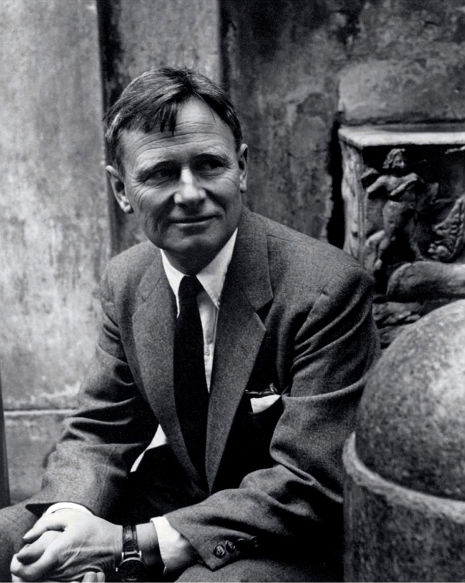
Christopher Isherwood’s best known fictional character is Sally Bowles, who appeared in his novel Goodbye to Berlin, published in 1939. Sally was a singer in a Berlin nightclub, The Lady Windermere, off Tauentzeinstraße, and was supposedly an heiress (her father owned a mill in Lancashire), and had grand ambitions to become a star.
She had a surprisingly deep, husky voice. She sang badly, without any expression, her hands hanging down at her sides – yet her performance was, in its own way, effective because of her startling appearance and her air of not caring a curse of what people thought of her…
Sally with her emerald green nail varnish (“Divine decadence, darling”) was memorably played by Liza Minelli in the film musical Cabaret, opposite Michael York as Brian Roberts (originally Christopher or “Herr Issyvoo” in the book) and Joel Gray as the Emcee, in 1972.
Sally was more than just one of Christopher’s greatest creations, she was in fact based on the journalist and actress, Jean Ross, who had once shared rooms with Isherwood at Nollendorfstrasse 17, Berlin in the early 1930s.
As Isherwood describes Ross, in this interview on Day at Night from 1974, she was a slightly larger-than-life character, who had the looks of the Hollywood film-star Merle Oberon. Born in Alexandria, Egypt, Ross was raised in England, before being sent to finishing school in Switzerland. She attended the Royal Academy of Dramatic Art, where she had a bit part in a “Quiky Quota” movie. Ross then moved to Berlin on the promise of some more film work, but this proved to be false, so she began a new career in modeling. It was around this time in 1931 that Ross met Isherwood, as the Oxford Dictionary of National Biography explains:
The two became close friends and Isherwood immortalized her as the eponymous heroine of Sally Bowles (1937), subsequently incorporated in his Goodbye to Berlin (1939). Although Ross later claimed that she was not really like Sally Bowles, most of the more outlandish anecdotes Isherwood used in his portrait were based on fact. She insisted that she was a much better singer than Sally Bowles, but her family disagreed.
An affair with a Jewish musician called Götz von Eick, who subsequently became an actor in Hollywood under the name Peter van Eyck, led to her becoming pregnant, and she nearly died after an abortion. She was visiting England when Hitler came to power and so decided not to return to Germany, settling instead in Cheyne Walk, London, where she joined the Communist Party; she remained a member for the rest of her life.
Inspired by Ross and her various wild adventures, Isherwood wrote a long short story, “Sally Bowles,” which he originally intended to include in his novel Mr. Norris Changes Trains, which was published in 1935. Isherwood sent the story to the editor John Lehmann, to be included in his literary magazine New Writing, but he thought it too long. Lehmann also had problems with certain aspects of the story—Sally’s abortion, and the possible issue of a libel suit from Jean Ross. Isherwood claimed the removal of the abortion scene would turn Sally into a “silly little capricious bitch” and would ruin the story’s finish. He also managed to convince Ross to give her permission for the story to be published, little knowing how successful and financially rewarding the fictional Sally Bowles would be.
I am a big fan of Christopher Isherwood’s writing and found him utterly charming and fascinating in this interview on Day at Night, where he talks about his time in Berlin during the thirties, his friendship with the poet W. H. Auden, his life at university and in America, his family, and how his writing is a voyage of self-discovery.
Previously on Dangerous Minds
Christopher Isherwood: Revealing documentary ‘A Single Man 1906-86’